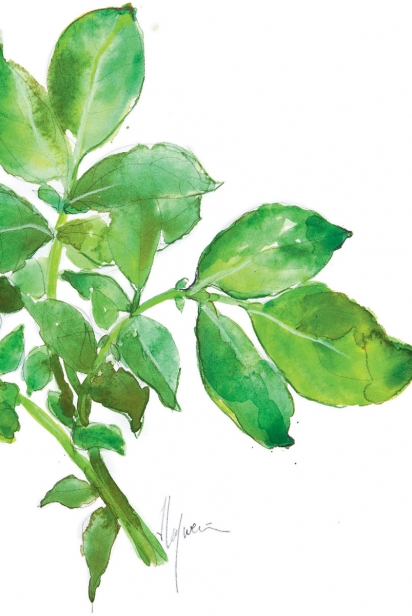No Small Potatoes: Spuds Mean Business in Teton Valley
John Hoggan of Grand Teton Organics is a wealth of potato knowledge. He’s quick to rattle off unusual spud varieties like Spartan Splash, Peppermint and Huckleberry Gold. He’ll also tell you about the cardiovascular benefits of purple potatoes and discuss the role recessive genes play in potato farming.
But Hoggan isn’t one of Idaho’s iconic commercial potato farmers. Rather he grows seed potatoes, a lesser known but equally vital part of the industry. Potatoes don’t grow true to seed, like apples. So every year, farmers have to plant small sprouting potatoes, or “seed potatoes,” in order to grow specific varieties.
The Idaho Certified Seed Law prevents commercial potato growers from planting their own saved seeds, which could potentially carry disease. Instead, they’re required to purchase potato seeds from certified growers to assure the health of their crop and the proliferation of their varieties.
Seed potato management areas—like the Teton Seed Potato Management Area, a 3,800-acre swath that spans Teton County and part of Madison County—have special pest management and isolation requirements to assure plants are less exposed to diseases like blight and Potato Virus Y, or PVY. Also, commercial potato production is not allowed within the management area.
“Because of the overwintering temps and lack of commercial growers in the area, we don’t pass disease or pathogens on to the commercial market,” explained Fred Dormaier, marketing director for the Teton Seed Marketing Association.
According to the National Potato Council, Idaho beat out North Dakota and Colorado as the largest seed potato producer in 2011, with 34,766 certified acres. And according to Dormaier, the Teton Seed Potato Management Area is “the second or third largest seed potato management area in Idaho.”
Hoggan’s Grand Teton Organics grows 50 varieties of seed potatoes on 10 acres in Newdale and supplies Teton Valley CSAs like Full Circle Farm and Cosmic Apple Gardens. Hoggan also specializes in potato variety development, plant disease identification and variety improvement through clonal re-selection. He offers consulting services to over 5,000 acres of eastern Idaho farms.
Potato plants tend to mutate over time, making Hoggan’s skills quite valuable in the industry. His certified organic seeds are prized for their disease-resistant qualities and high yields. They’re designated “Generation 1” seed, which means they’re produced from laboratorygrown, disease-tested parental stock so that they maintain manageable disease levels and varietal purity.
“Potatoes are like humans,” said Hoggan. “And over time, the recessive genes take their toll.”
But genetics is only one of the complicated aspects of growing seed potatoes. Dennie Arnold and his two sons, Eric and Jeremy, grow 1,300 acres of conventional seed potatoes in Felt—varieties like Russet Burbank, Russet Norkotah, Ranger Russet and sometimes red, depending on market demands.
In the early 1900s, Arnold’s grandfather converted the lease on his sheep grazing land to an agricultural lease.
“My dad bought it from my grandfather, who went through the Depression,” said Arnold.
Arnold’s father, a federal and state potato inspector, drilled a well and started farming seed potatoes. Today, Arnold Farms is one of the biggest employers in Teton Valley, providing work for 20 year-round employees—a number that doubles during harvest season. But because of lower yields in high altitude growing (250 to 275 seed potato sacs per acre compared to the 400 to 500 sacs commercial potato growers get), Arnold Farms also grows 3,600 acres of malt barley for the beer industry and 100 acres of wheat and hay.
In addition to struggling with lower yields in a high-altitude environment, Hoggan says there are extra costs involved in growing certified organic seeds—like hand weeding, expensive organic fertilizer and various certification costs. Hoggan holds dual organic certification from both the Idaho Department of Agriculture and the Idaho Crop Improvement Association.
Despite these challenges, Arnold says he enjoys the seed potato lifestyle and says it has afforded his family a way to keep everyone in Teton Valley—something that’s not easy to do in a small town.
“As long as you can make a living, there is a lot of freedom with it,” Arnold said.
Hoggan agreed. When asked why he goes through the trouble, he joked: “When I die they’ll cut me open and there will just be Salmon River water and potato juice running through my veins. Potatoes are my life.”
Christina Shepherd McGuire believes that creative traditions shape values and communities. As a mother, she strives to create a wholesome, balanced life through recreation, cooking, gardening, tending to animals and laughing a lot. As managing editor for Teton Family Magazine, she encourages others to strive for the same and to “live fully.” Read more of her musings at ChristinaShepherdMcGuire.com.






